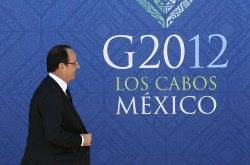Financial crisis tops agenda at G20 summit
19/06/2012| IslamWeb
World leaders have been struggling to inject confidence into the global economy at a G20 summit in Mexico dominated by a spiraling European debt crisis that is spooking markets and paralyzing growth.
Mexico's President Felipe Calderon on Monday welcomed the likes of US President Barack Obama, newly returned Russian leader Vladimir Putin and German Chancellor Angela Merkel to a conference center in the hills above the resort of San Jose del Cabo.
Two days of talks focusing on the global economic crisis began with lingering divisions over the correct formula for a return to growth, in particular over how to balance austerity and stimulus.
The heads of the world's 20 biggest economies welcomed Greek voters' decision to back parties that are committed to the terms of their European Union and IMF-led bailout, but there was no respite for the Eurozone from the markets.
Hopes that the Greek vote on Sunday had helped the single currency bloc get on top of the crisis took a hit as attention turned to the fragile economies of other EU members and Spanish borrowing costs soaring to record levels.
Italian and Spanish stocks plunged and the euro also fell against the dollar.
Obama, who fears the turmoil in Europe will drag down the broader world economy and damage his own hopes of re-election in November, was to hold a separate meeting later on Monday with EU leaders to discuss the crisis.
As he met Calderon ahead of the official start of the summit, Obama said the world was "very concerned" about slowing economic growth and urged leaders to do what is needed to stabilize the financial system.
The US leader said the summit should ensure "the economy grows, the situation stabilizes, confidence returns to the markets and, most importantly we're giving our people the chance, if they work hard, to succeed and do well".
'Common effort'
Merkel has come under pressure to soften her hardline stance on the austerity measures Europe imposed on indebted Eurozone members, which some argue have sabotaged economic growth.
Merkel said that full details of the European plan would not be revealed until the European summit at the end of the month, but that she expected a "good" G20.
Eurozone powers agreed last week to provide a bailout loan of up to 100 billion euros ($125bn) to salvage Spain's stricken banks, but the deal failed to quell the intensifying storm on the debt market.
In a sign of the underlying tensions at the summit, EU Commission chief Jose Manuel Barroso bristled when questioned on European credibility and issued a fierce defense of the bloc's handling of the crisis.
"Frankly, we are not coming here to receive lessons in terms of democracy or in terms of how to handle the economy," he said.
European Council president Herman Van Rompuy said the draft G20 statement showed "support and encouragement for the euro area countries and leaders and for the European Union as a whole to overcome this crisis".
"We are not the only ones that are so-called responsible for the current economic problems all over the world," he said.
The International Monetary Fund, hoping to prevent a worsening of the global economic crisis, called last year for $500 billion in an emergency firewall to support nations at risk of contagion, but the money has fallen short.
Leaders of the so-called BRICS - Brazil, Russia, India, China and South Africa - expressed reluctance in Los Cabos about stumping up more cash until existing funds had dried up and emerging nations were given greater IMF clout.
PHOTO CAPTION
French President Francois Hollande arrives at the G20 Summit in Los Cabos June 18, 2012.
Al-Jazeera

